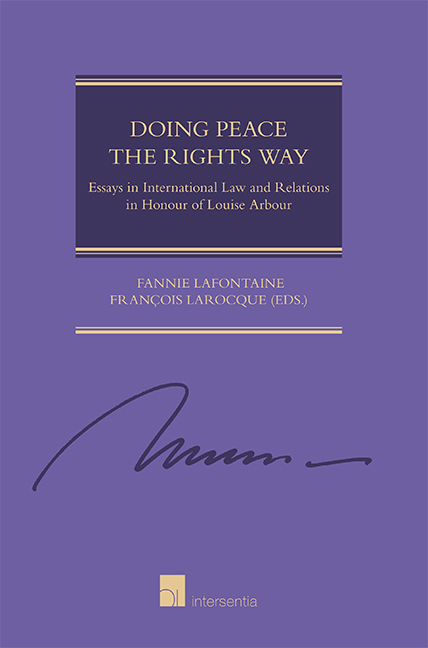Book contents
- Frontmatter
- Foreword
- Contents
- List of Contributors
- Introduction
- PART I OF FREEDOM AND EQUALITY
- Human Rights Obligations for Non-State Actors: Where Are We Now?
- The Right to Truth: When Does it Begin?
- Corruption, Inequality and Boko Haram in Nigeria
- Social and Economic Rights and the Legal Imagination
- Building a Culture of Inclusivity in a Diverse Society
- Made in Canada: A Failed War on Drugs
- Unaccompanied Children Out of Their Country of Origin: Trapped in the Administrative Net
- PART II OF PEACE AND JUSTICE
- PART III OF WOMEN AND LEADERSHIP
- An Interview with the Honourable Madam Justice Louise Arbour
Made in Canada: A Failed War on Drugs
from PART I - OF FREEDOM AND EQUALITY
Published online by Cambridge University Press: 13 April 2019
- Frontmatter
- Foreword
- Contents
- List of Contributors
- Introduction
- PART I OF FREEDOM AND EQUALITY
- Human Rights Obligations for Non-State Actors: Where Are We Now?
- The Right to Truth: When Does it Begin?
- Corruption, Inequality and Boko Haram in Nigeria
- Social and Economic Rights and the Legal Imagination
- Building a Culture of Inclusivity in a Diverse Society
- Made in Canada: A Failed War on Drugs
- Unaccompanied Children Out of Their Country of Origin: Trapped in the Administrative Net
- PART II OF PEACE AND JUSTICE
- PART III OF WOMEN AND LEADERSHIP
- An Interview with the Honourable Madam Justice Louise Arbour
Summary
On 21 February 2010, while Michael Swan was watching Canada's gold medal hockey team play the United States, three young men from Toronto were driving down a dark highway toward Ottawa. The “Toronto three,” as they would come to be known, had a plan to make some easy money. They were going to steal Michael Swan's marijuana.
Swan was murdered later that night – killed by a single bullet that pierced his lung and tore apart his heart.
There was nothing particularly unique about Michael Swan. He was a typical teenager, he came from a good family, he had a tight circle of friends and, like almost half of all Canadians have done, he smoked marijuana. He also sold marijuana, mostly to his friends, but rumours that he had a large supply of marijuana had travelled to Toronto.
In the early hours of 22 February 2010, the Toronto three, their faces masked, burst into Swan's house. They ordered Swan to tell them where he kept his supply of pot. Swan did not answer quickly enough and was shot. He died on the floor of his bedroom. Killed over a few pounds of pot.
I represented one of the Toronto three. Like Swan, he was 19 years old. He had no prior criminal record. He did not shoot Swan, but he was there when it happened. He was convicted of second-degree murder and received a life sentence. All of the Toronto three were convicted and all are serving life sentences.
Some cases stick with you; this is an occupational hazard for a criminal defence lawyer. Oft en we remember cases because of the result, the unexpected victory or the wrongful conviction. I remember the Swan case because of the heart-breaking victim impact statements given by his parents. Michael Swan's mother told the court that she hated her life: “I wish I could go to sleep and never wake up.” Michael's father told the court about the guilt he lives with: “Ultimately, it was my job to protect my child, to identify the dangers and do whatever was required to deal with them. I thought I was doing this, but it proved not to be enough. I must live with this guilt for the rest of my life.”
- Type
- Chapter
- Information
- Doing Peace the Rights WayEssays in International Law and Relations in Honour of Louise Arbour, pp. 103 - 120Publisher: IntersentiaPrint publication year: 2019



